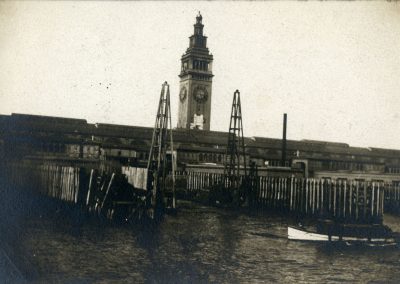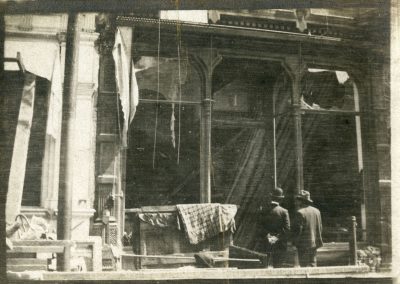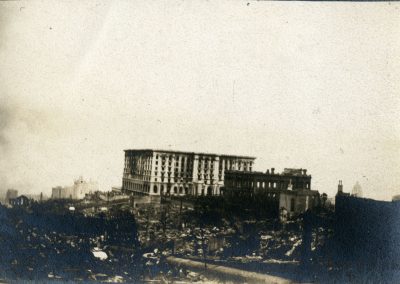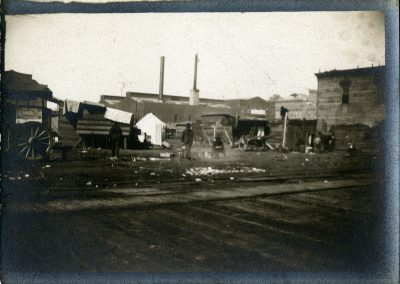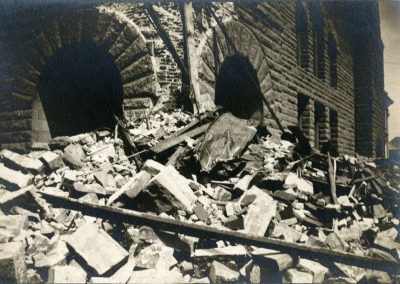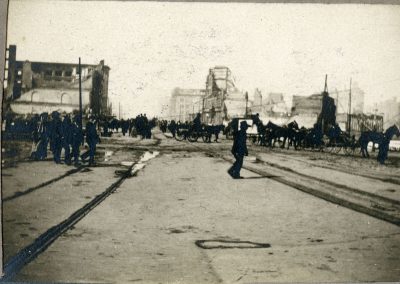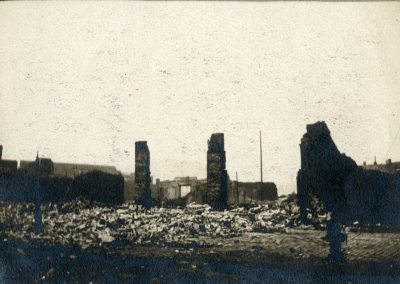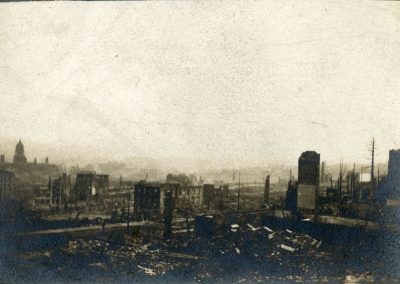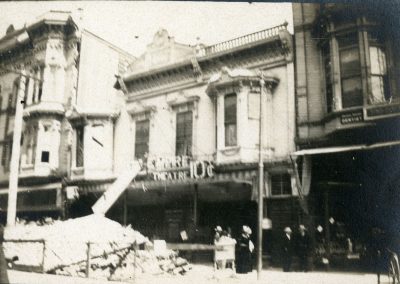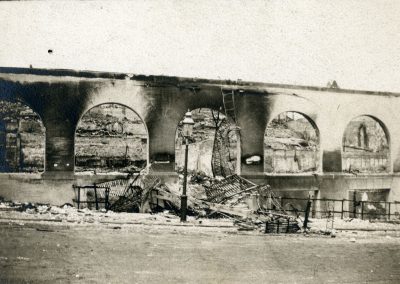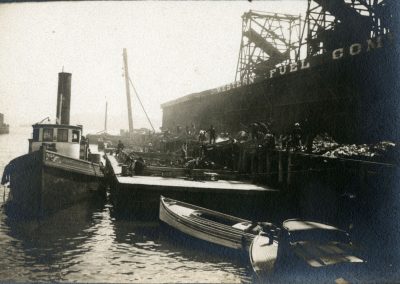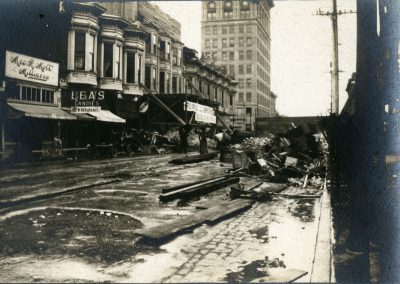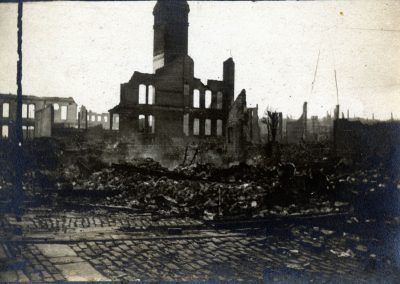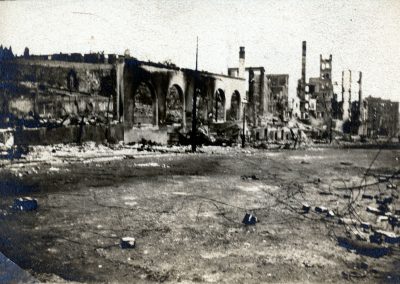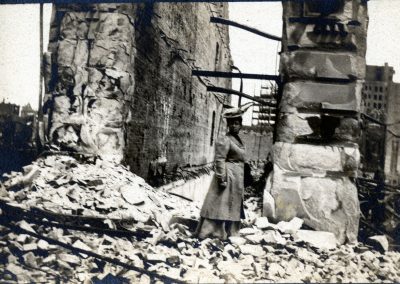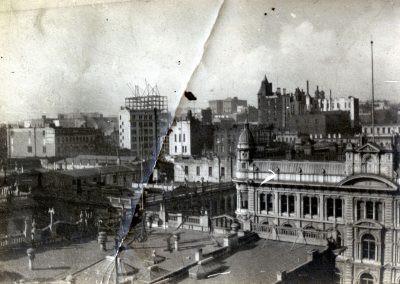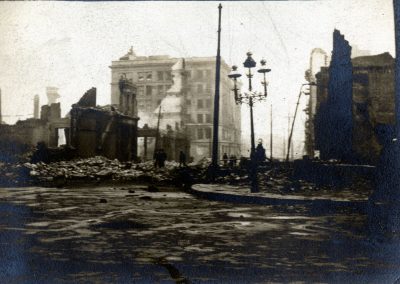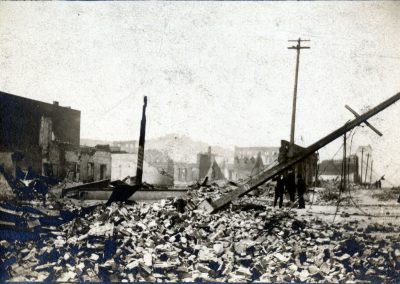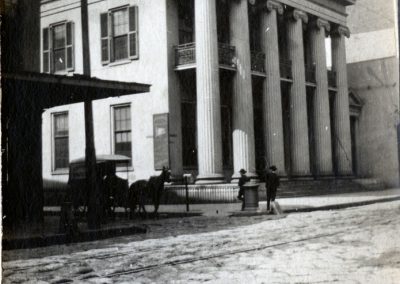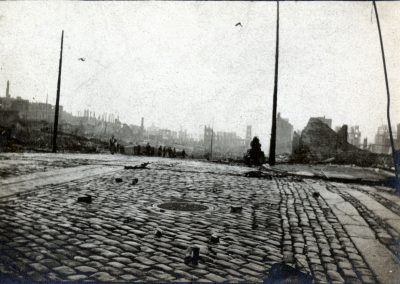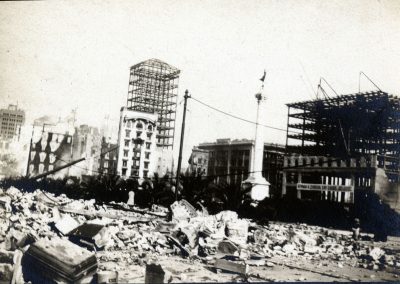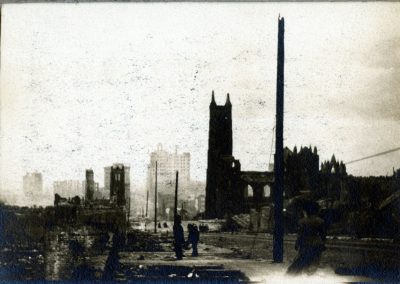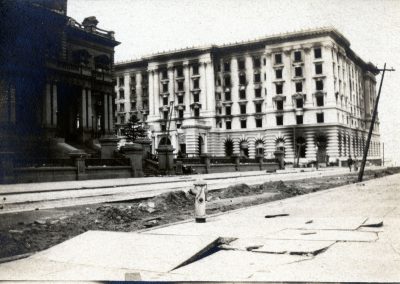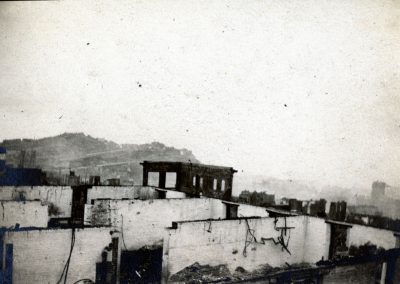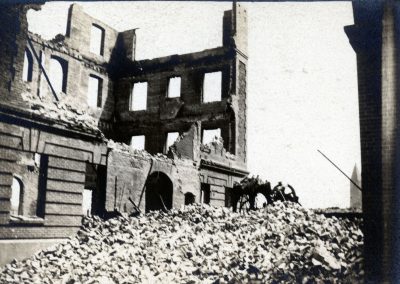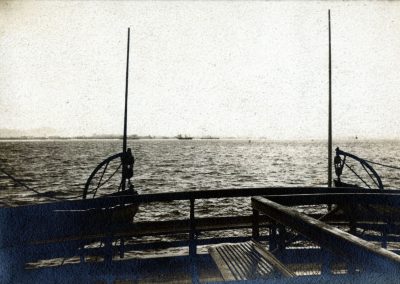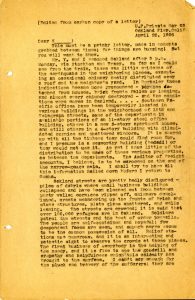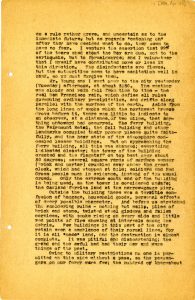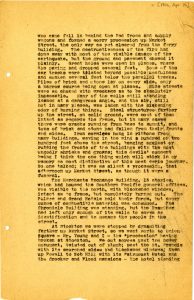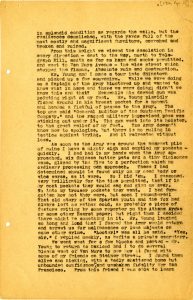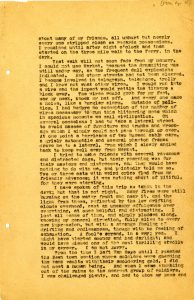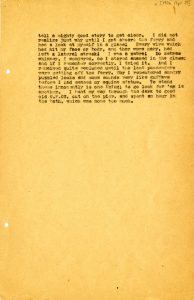Great Nebraska
Naturalists and Scientists
In 1906, Shoemaker’s narratives expand from a focus on Nebraska to his experiences
following the earthquake and fire in San Francisco on April 18, 1906. He and his employer
Eratus Young arrived in Oakland, California, on April 23, 1906. Shoemaker spent eights
day in Oakland and regularly visited San Francisco until he left on May 1, 1906.[1] He described the earthquake as “a sad affair compared with others; the desolation
is beyond description, and many of my friends suffered the loss of everything they
had.”[2] In a carbon copy of a letter dated April 26, 1906, Shoemaker detailed his experience
in the city after the earthquake.
1
U.P. Private Car 03
Oakland Pier, Calif.
This must be a patchy letter, made in moments grabbed between times; for things are
buzzing! But you will want to know.
Mr. Y. and I reached Oakland after 5 p.m. Monday, via Stockton and Tracy. So far as
I could see from the train, there was little evidence of the earthquake in the neighboring
places, excepting an occasional chimney neatly distributed over a roof and the neighbor’s
yard. In Berkeley those indications became more pronounced — porches detached from
houses, brick fronts fallen or leaning, and almost every chimney destroyed — and the
conditions were worse in Oakland…. Southern Pacific offices have been temporarily
located in various buildings in the neighborhood of 18th and Telegraph Streets, some
of the departments in available portions of an 11-story steel office building, others
in a new 3-story apartment house and still others in a 4-story building with dilapidated
cornice and shattered windows. It is shored up with all the timbers they could find
room for, and I presume is a seaworthy building (bedad!) or they would not use it.
As yet I know little of the distribution to be made of these various properties as
between the departments. The Auditor of Freight Accounts, I believe is to be marooned
on the end of this narrow-gauge mole. I shall try to have all this information nailed
down before I return to Omaha.
Oakland streets are pretty badly disfigured — piles of debris where small business
buildings collapsed and have been cleaned out from between party walls, cornices ripped
off, chimneys demolished, cracks meandering up the fronts of brick and stone structures,
plate glass shattered, and walls leaning. The streets are crowded; it is said that
over 100,000 refugees are in Oakland. Soldiers patrol the streets and the best of
order prevails. The people are self-contained and hopeful: few despondent faces are
seen, and superb nerve seems to be the common possession of all. Relief stations are
numerous, and it is an interesting and pathetic sight to observe the crowds at these
places. The first business of everybody is the helping of the needy, and it is fine
to see the goodwill and sympathy and helpfulness which this calamity has brought to
the surface. I can’t say enough for the pluck and bravery of the sufferers; they are
2
as a rule rather grave, and uncertain as to the immediate future, but as regards “catching
on” after they have decided what to do, they seems to have no fear. I venture the
assertion that 99% of the tears shed about the Bay are due, not to the earthquake,
but to formaldehyde; and I volun-tear that I myself have contributed more or less
in this direction. The disinfectants are fierce but the authorities seem to have sanitation
well in hand, so we must forgive them.
Mr. Young and I went over to the city yesterday (Tuesday) afternoon, at about 3:30.
The weather was cloudy and rain fell from time to time — the real San Francisco rain,
which defies all rules governing ordinary precipitation, and drifts along parallel
with the surfaces of the earth. Aside from the long lines of smoke which the northwest
breeze drove before it, there was little to indicate to an observer, at a distance
of two miles, that anything untoward had occurred. The ferry building, the Fairmount
Hotel, the Call Building and other landmarks occupied their proper places quite faithfully,
and the hazy state of the atmosphere concealed lesser buildings. But on approaching
the ferry building, all this was changed; everything indicated disaster; the tower
of the building cracked and the flagstaff on top bent over about 30 degrees; several
square yards of surface veneer (brick and mortar) crumbled away under the great clock,
which had stopped at 5:16; soldiers and Red Cross people much in evidence, instead
of the usual crowd. Only the extreme south end of the building is being used, as the
tower is considered unsafe; the Oakland ferries land at the narrow-gauge pier.
Outside the building there was a terrible confusion of baggage, household goods, personal
effects of every possible character. And before us stretch the smoldering ruins —
nothing but walls, piles of brick and stone, twisted steel girders and fallen cornices,
with smoke rising on every side and little red points of fire showing at intervals
among the debris. Few buildings in this part of the city retain even a semblance of
their normal lines, for it is all “made” land, and the destruction is almost complete.
It was pitiful and disheartening; the grand and the awful had had their day and were
things of the past.
Owing to military restrictions no one is permitted on this side without a pass, so
the passengers on our ferry were few; the hundred or thereabout
3
who came fell in behind the Red Cross and supply wagons and formed a sorry procession
up Market Street, the only way as yet cleared from the ferry building. The destructiveness
of the fire had done away with most of the visible damage of the earthquake, but the
ground and pavement showed it plainly. Great holes were open in places, where the
paving had dropped several feet. Some of the car tracks were twisted beyond possible
usefulness and sunken several feet below the parallel tracks. Piles of brick and stone
lay on every side, only a narrow course being open at places. Side streets were so
choked with wreckage as to be absolutely impassable. Many of the walls still standing
leaned at a dangerous angle, and the air, still hot in many places, was laden with
the sickening odor of burning things. Steel structures farther up the street, on solid
gound, were most of them intact as regards the frame, but in many cases there were
cracks running from base to summit, and tons of brick and stone had fallen from their
fronts and sides. Iron cornices hung in ribbons from many buildings, waving in the
wind a hundred or two hundred feet above the street, banging against or rubbing the
fronts of the buildings with the most ungodly shrieks and groans; this devils’ concert
being I think the one thing which will stick in my memory as most distinctive of this
most eerie journey. No one talked; it was a silent a procession, that afternoon up
Market Street, as though it were a funeral.
The Merchants Exchange Building, 13 stories which had housed the Southern Pacific
general offices, was visible to the north, with blackened windows, intact as to frame,
but completely burned out. The Palace and Grand Hotels held their forms, but every
ounce of combustible material was consumed. The Chronicle Building was standing, but
the Examiner had left only enough of its walls to serve as identification and to menace
the people in the street.
At Stockton we were stopped by dynamiting farther up Market Street, so we went north
to Union Square — Mr. Young and I — the “procession” having broken at Stockton. We
cut across past the Dewey monument, twisted out of plumb; past the St. Francis with
its scorched sides and blackened windows; then up Powell to Nob Hill with its Fairmont
Hotel and the Crocker and Flood mansions — the hotel standing
4
in splendid condition as regards the walls, but the
residences demolished, with the yards full of the
most costly and magnificent furniture, scorched and
broken and ruined.
From this height we viewed the desolation in every direction — east to the Bay, north
to Telegraph Hill, south as far as haze and smoke permitted and west to Van Nuys Avenue[3] — the wide street which stopped the flames. Absolute ruin and destruction.
Mr. Young and I made a tour into Chinatown and picked up a few sourvenirs. While we
doing so a Captain of the Army blustered up and wanted to know what in here and there
we were doing; didn’t we know this and that? Meanwhile his darned gun was point right
at my feet. Mr. Young placidly fished around in his breast pocket for a moment and
hand a fistful of passes to the Army. The top one said “General Auditor of the Southern
Pacific Company.” and the ragged military improvised pass was sticking out under it.
The gun went into its holster to the great relief of my feet. The Army doesn’t know
how to apologize, but there is no ruling in tactics against trying. And it retreated
without loss.
As soon as the Army was around the nearest pile of ruins I hove a mighty sigh and
emptied my pockets — quickly. I had had in my hands when the Army approached, six
Chinese butter pats and a tiny Cloisonee vase, glazed by the fire to a perfection
which no ordinary processing can approach. These I had determined should be found
only on my dead body or vice versa, as it were. So I hid ’em. I reasoned very brilliantly
for the time permitted, that if in my coat pockets they would sag and give me away.
So into my trouser popckets they went. I had forgotten how hot they were, but soon
I remembered! That old story of the Spartan youth and the fox had always left me rather
cold, as probably a piece of feature writing by some reporter on the Athens Argus
or some other Hearst paper; but right then I decided there might be something in it.
Mr. Young laughed so long and loud that I feared the Army would return and arrest
us for malfeasance or lese majeste[4] or some other crime. “Looter!” was all he said. “Yes, sir,” I replied meekly, as
befits a private secretary.
We went west for a few blocks and parted — Mr. Young to return to Oakland and I to
go several blocks west of Van Nuys to see how it fared with some of my friends on
Steiner Street. I found them alive and kicking, with a badly shattered home but unbounded
confidence in and unshaken fidelity for San Francisco. From this friend I was able to learn
5
about many of my friends, all unhurt but nearly every one stripped clean as regards
possessions. I remained until after eight o’clock and then started on the three mile
walk to the ferry, in the dark
That walk will not soon fade from my memory. I could not use Market, because the dynamiting
was still under way, as the frequent dull explosions indicated. And other streets
had not been cleared. I became involved in telegraph, telephone, trolly and I know
not what other wires. I would run into a wire and the impact would rattle the tinware
a block away. The wires would grab for my feet, saw my neck, knock my hat off. And
every one made a noise, like a burglar alarm. Outside of politics, I had before no
conception of the number of wires necessary to run this blithering mess which in spacious
moments we call civilization. On several occasions I had to take a lateral street
to avoid masses of furniture and trunks and wreckage which I simply could not pass
through or over. At one point a barricade of two burned cable cars, a grisly automobile
and several phaeton frames drive me to a lateral, from which I slowly angled back
to keep well away from Market.
I tried to make friends with several ravenous and distracted dogs, but their yearning
was for their masters and mistresses, and they would have nothing to do with me, and
pointedly told me so. Two or three cats with weird cries fled from my friendly advances;
it was nothing short of pitiful, for they were starving.
I have spoken of this trip as taken in the dark; but that is not right. Many fires
were still burning on the water front and near it, and the light from these, reflected
by the low drifting clouds overhead, cast an uncanny effulgence over everything, at
once helpful and distracting. I lost all sense of time, and simply plodded along,
knowing my general direction, fully alive to every new impression, but with a strange
feeling of drifting and endlessness, though with no feeling of exhaustion. A fool’s
errand, in a way; yes. I might have started sooner and had daylight; and would have
missed on of the most thrilling strolls in my career. I am not sorry.
From the time I left Van Nuys until I reached the down town section where soldiers
were guarding the bank vaults with their smoldering gold, I did not meet a human being.
And when I came stumbling out of the ruins to the nearest group of soldiers, I was
challenged plenty, and had to show my pass and
6
tell a might good story to get clear. I did not realize just why until I got aboard
the ferry and had a look at myself in a glass! Every wire which had hit my face or
body, and they were many, had left a lateral streak! I was a zebra! Do zebras whinney,
I wondered, as I stared amazed in the glass; and if I remember correctly, I tried
it. And I remained quite secluded until the last passengers where getting off the
ferry, for I remembered sundry puzzled looks and some sounds very like guffaws before
I had sensed my equine status. To stand these innocently is one thing; to go look
for ’em is another. I bent my way through the dark to good old U.P. 03, out on the
pier, and spent an hour in the bath, which was none too much.
Notes:
1 Shoemaker, letter to Horn, May 10, 1906 [back]
2 Shoemaker, letter to Mr. Goss, May 19, 1906 [back]
3 Probably Van Ness Avenue [back]
4 Offense against a ruler or sovereign (Merriam Webster 1945, 1418) [back]
